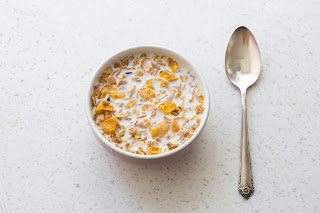What is Riboflavin? The understanding nutrients series
Let’s get right into this edition of the understanding nutrients series, looking at vitamin B2. I started this series over a year ago to help you understand all the roles of the essential nutrients in your food. You can find all the other nutrients I’ve already done here.
What is vitamin B2?
Vitamin B2, also called riboflavin, is a water soluble B
vitamin. It’s one of the 8 B vitamins. A water soluble vitamin means that the
vitamin isn’t stored in the body as it dissolves in water. And so, any excess
comes out in your wee. You can get all the riboflavin you need from your diet.
Roles of vitamin B2:
Riboflavin has many roles in the
body, so I’ll touch on a few:
Energy production: all of
the B vitamins play a role in energy production – this is what allows us to get
energy from the food we eat. Riboflavin in particular is a crucial co-enzyme in
the process. This means it’s needed for an enzyme to work properly. It supports
many enzymes throughout the energy production process with the end result being
the creation of ATP – the energy currency of our cells.
Other enzymes: riboflavin
also acts as a co-enzyme and supports other enzymes in many different parts of
the body. It helps with the metabolism of fatty acids in the brain, and the
coordination of the thyroid hormones.
Red blood cells:
riboflavin is involved in the creation of red blood cells and supports iron
utilisation. This in turn affects the transport of oxygen to your body cells. It’s
been shown that a higher intake of riboflavin can increase red blood cell
production.
Riboflavin also plays a part in
your eye health, collagen production, the immune system, and supporting growth
of cells.
How much vitamin B2 do we need?
Riboflavin is absorbed in your small intestine. Adult men
need 1.3mg a day while adult women need 1.1mg. If you’re pregnant, you need an
additional 0.3mg and if you’re lactating, you need an additional 0.5mg a day.
What foods are sources of vitamin B2?
Meat, dairy, nuts, and some vegetables are sources of B2. It
also is added to foods like breakfast cereals for fortification. This isn’t an
exhaustive list but to give you an idea:
- 30g of coco pops cereal (fortified with riboflavin) has 0.36mg
- 30g of Multigrain cheerios’ (fortified with riboflavin) has 0.25mg
- 2 poached eggs have 0.41mg
- 100g of plain yoghurt has 0.27mg
- 25g of almonds (a handful) has 0.29mg
- 100g of pork shoulder has 0.29mg
- 100g of beef steak has 0.21mg
- 80g of baby spinach has 0.14mg
- 80g of steamed* broccoli has 0.12mg
*I used the value of steamed broccoli over boiled because if
you cook your vegetables in water the riboflavin will leech out into the water,
which is normally discarded. This is due to B2 being water soluble, and so it'll
dissolve into the cooking water. If you want to retain the most nutrients, you
need to cook with the least amount of water possible and cook it quickly. Methods like steaming or
stir frying work well here.
What happens if we don’t get enough vitamin B2?
You should be able to get all the vitamin B2 you need from
your diet. However, it’s thought that about 10-15% of the global population
have a condition that restricts the absorption and utilisation of riboflavin.
It would also be expected that someone would be deficient in multiple
nutrients, and not B2 alone.
A deficiency in B2 can lead to symptoms such as weakness,
anaemia, fatigue, oral pain and tenderness, itchy eyes or blurred vision, skin
inflammation and irritation.
It’s treated with supplementation, usually through tablets
but it can be via an injection.
Key points:
- Vitamin B2 has many roles including: supporting enzymes in energy production and so helping us get energy from food, red blood cell production, and supporting thyroid hormones.
- Men need 1.3mg of B2 a day while women need 1.1mg.
- Sources of B2 include: fortified breakfast cereals, meat, dairy, vegetables, and nuts.
- A deficiency in B2 can lead to symptoms like fatigue, skin inflammation, and itchy eyes.
I hope you enjoyed this blog post!
Bye for now 👋
References:
https://quadram.ac.uk/UKfoodcomposition/
https://www.nhs.uk/conditions/vitamins-and-minerals/vitamin-b/

.jpg)

.jpg)
.jpg)

Comments
Post a Comment